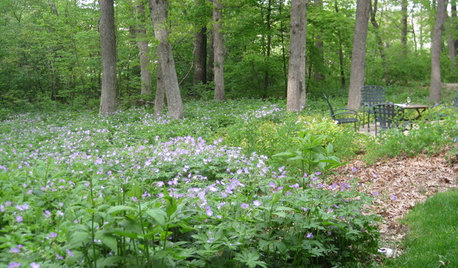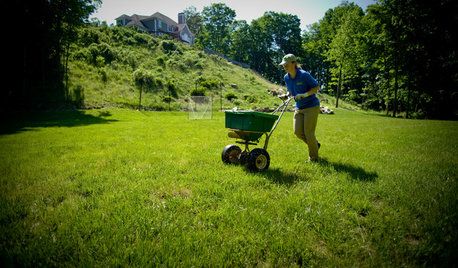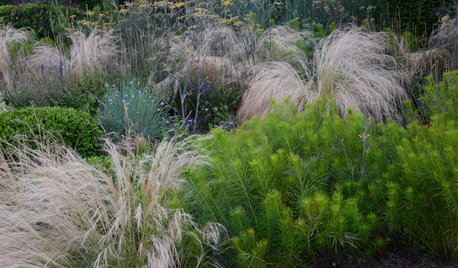Horticultural Myths
Hi, i'm usually on the rose forum, just stopping by to pass this information on. Here some good articles to read. Jim
http://www.puyallup.wsu.edu/~Linda%20Chalker-Scott/Horticultural%20Myths_files/index.html
Comments (43)
sergeantcuff
14 years agolast modified: 9 years ago"move" ??? I thought these articles were very interesting. Thanks for sharing, Jim.
Related Professionals
Clark Landscape Architects & Landscape Designers · Norwood Landscape Contractors · Pelham Landscape Contractors · Springfield Landscape Contractors · Burlington Landscape Contractors · Homewood Landscape Contractors · Hoover Landscape Contractors · Kahului Landscape Contractors · Mahwah Landscape Contractors · Stallings Landscape Contractors · Wilton Landscape Contractors · North Aurora Landscape Contractors · York Decks, Patios & Outdoor Enclosures · Riverside Decks, Patios & Outdoor Enclosures · Finneytown Stone, Pavers & Concretegardengal48 (PNW Z8/9)
14 years agolast modified: 9 years ago"Interesting" is certainly one description! The fact that some - not all - of her articles have very little basis in reality and are widely disputed and even denounced in horticultural circles should be pointed out before anyone takes them immediately to heart. And despite whatever credentials the author may produce to substantiate their opinions, unless those opinions are shared by their peers, and relatively widely at that, AND substantiated by scientific evidence, I'd tend to avoid them as being just the proliferation of a few more myths :-)
lazy_gardens
14 years agolast modified: 9 years agogardengal ... do you have any links to peer-reviewed published studies that refute her statements?
Saying that she's "denounced in horticultural circles" means very little.
Dan _Staley (5b Sunset 2B AHS 7)
14 years agolast modified: 9 years agoI agree with gg and JAG as well, you take LC-S with a grain of salt. Often she is right, but not always & enough to be problematic as a resource. I won't reject her stuff outright, however.
2
Dan
gardengal48 (PNW Z8/9)
14 years agolast modified: 9 years agoWhat links I can provide you can find just as easily....I'm not at all sure I feel like conducting your research for you. Most of this stuff is not rocket science -- it has been discussed and written about ad nauseum -- and some of the topics are conspicuous in that Ms. C-S seems to hold the single differing or dissenting view. I'll let you find 'em :-)
sergeantcuff
14 years agolast modified: 9 years agoJustaguy - Do you have any links?
Gardengal - I'm still not sure what you mean. What little I know of her is from Gardenrant and The Garden Professors (Washington State University). Some of what she says jibes with my experience as a gardener. What about Jeff Gillman and the others - are they on your "bad list" as well?
justaguy2
14 years agolast modified: 9 years agoJustaguy - Do you have any links?
I will present an example of what I mean by the statements I made about her articles and her cherry picking sources instead of letting the whole of the research speak for itself.
Here is her 2006 article making a case that harvesting peat moss is not environmentally friendly. Unfortunately, there is no economically realistic,
environmentally friendly way to harvest peat moss. This is a natural resource that accumulates at
the glacially slow rate of 0.5 1.0 mm per year, or about ¼ of an inch. Peat harvesting involves
the removal of deep layers of peat that have literally taken centuries to accumulate. In fact, since
harvesting implies sustainability, it is more accurate to describe commercial peat removal as
mining.There are problems with this claim. The first problem is it ignores the fact that peat is being harvested from Canadian wetlands at a rate *less* than it is growing. This fact makes the practice sustainable. The Canadian government regulates the peat harvested to ensure sustainability.
This next quote is a favorite in some circles and shows an utter lack of understanding the issue. Perhaps most important is that they are the single largest terrestrial store of carbon,
equivalent to 75% of all carbon in the atmosphere (CC-GAP, 2005). Paradoxically, the
destruction of peatlands is not yet recognized as a significant part of global climate change.It's true a lot of carbon is sequestered in these wetlands. What isn't mentioned though is that these peat bogs are decomposing anaerobically. This results in the release of methane gas. Methane is exponentially more potent than CO2 as a greenhouse gas. Here is an article about it. Here is a more scholarly look that includes lots of citations for further reading if so inclined.
Additionally, some of her information is coming from the UK and European based sources. There have been problems with peat harvesting there in the past. Unfortunately those with an axe to grind against peat harvesting in the northern US and Canada like to cite European, mostly UK, sources to support their statements when there is really no comparison to the North American harvesting.
The Canadian harvest of peat is actually viewed as a leading example of sustainable harvesting of a resource by many groups and governments. What Chalker-Scott seemed to do here was get her 'facts' from biased sources and not take the time to consider other view points.
I really, really, really hope this thread doesn't now degenerate into a peat=good/peat=bad thread. My purpose was to give an example of how she selectively provided facts while ignoring others in order to make a case. I also showed that she starts her own myths (or at least perpetuates them) when she implies the rate of harvest is not sustainable when it clearly is. Whether peat is good/bad is NOT the point I was making, m'kay folks? ;)
tsugajunkie z5 SE WI ♱
14 years agolast modified: 9 years agoI think the point being made here is not that everything LC-S says is wrong, it's just that many folks take everything she says as Gospel and that just isn't so. And you won't find an unbiased view of her from Washington State University given she is (or was, at least) part of the University. Like gardengal says, if you search these forums you'll find the ink.
tj
serenasyh
14 years agolast modified: 9 years agoegads! I'm not sure whether I want to step into an embroiled debate already, but LOL! it is sort of stirring up the bog so-to-speak. My own newbie 2-cents worth is that I think it's important to weigh in the peat moss. I'm not sure if any of you organics people watched the PBS Natural Parks series--a truly wonderful series about conservation. Again, humankind has a tendency to skim over anything to justify usage of natural resources. Peat moss should! be very carefully used and I do applaud Linda for at least addressing these concerns. It sort of reminds me of how forestry in the U.S. likes to pretend to be "sustainable" saying, oh yeah, we do replenish the trees by "replanting" but the mountainscapes still look horrible when they're done cutting down all the trees. And don't forget U.S. forestry were the ones who at one time cut down precious ancient sequoias too with impunity! before someone tried to halt or limit their "exploits".
Peat moss isn't easy to replenish, we have to remember that. And it permanently changes the native fauna as well.
"Environmentalists rightly note that even reclaiming the land into a wetland alters the ecology of an area, puts some species at risk and can never bring back the historic features of the bog. Not only is recolonization by the native flora and fauna probably not going to happen, the complex water tables in adjacent undrained areas are also put under threat.
Some wetlands scientists point out that a managed bog bears little resemblance to a natural one. Like tree farms, these peatlands tend toward monoculture, lacking the biodiversity of an un-harvested bog."
Again, this is not a bog debate and we shouldn't get bogged down by just this fact. But I do believe that Linda's writings do open our minds to at least search out for ourselves what are the myths. Thank goodness for the internet. We can do our own exploring, but again, I tend to go by University writings the most, papers done by scientists themselves. Sometimes one has to keep digging and digging and digging to get to the heart of the matter.
I do thank Jim, that at least he is trying to find valuable research. And I think what's great about forums is that we too can do counter-claims and our own research as well. Links are very important so that we can exchange information and widen the discussion. DEBATES BRING KNOWLEDGE! If there are particular areas which we feel are false it's good to go ahead and put in links to support our feelings. I am also curious as to what other aspects are myths that Linda is supposedly creating. At least for me, her concerns about peat moss are valid.
Kimmsr
14 years agolast modified: 9 years agoThere seems to be a very large number of people that will not look at ideas and concepts that oppose those they hold dear. Because Dr. Chalker-Smith holds the the harvesting of peat moss is unsustainable there are a number of people that using information from the peat moss industry will do everything they can to show that someone that supports that has no idea what they are talking about. Sometimes a very large number of people support the wrong concepts beciase they are not looking at the right information. Horticulturists from all over the world in a meeting in Iran in the 1960s stated that harvesting peat moss was an unsustainable practice that needs to be ended. Unfortunately it is a very large, and profitable, business in Canada and is unlikely to be looked at that way by the Canadians for many years since the taxes support many programs.
justaguy2
14 years agolast modified: 9 years agoAt least for me, her concerns about peat moss are valid.
The issue isn't whether or not her 'concerns' are valid, at least not within the context of this thread.
The issue is whether or not she cherry picks her sources to support her positions or if she surveys the available information and lets it speak for itself or at least provides more than one side of the issue. In her peat article she mentions statements *only* from agenda driven groups. I am not implying their agenda is good/bad or right/wrong, only that they are obviously agenda driven. She also mentions the UK, but as I noted the UK problems have no bearing on the North American situation. In her footnotes she provides 4 links. 3 to agenda driven sources and one to a more neutral source.
Nowhere did she list or address sources from the peat industry or the Canadian government regulating the industry.
This isn't credible research, it's cherry picking ;)
Many of us have seen how the writings of L C-S influence others who then adopt positions where they take this imbalanced 'knowledge' even further.
Take our very own Kimmsr who says: Horticulturists from all over the world in a meeting in Iran in the 1960s stated that harvesting peat moss was an unsustainable practice that needs to be ended.
This simply isn't accurate. Kimmsr is referencing the Ramsar Convention on Wetlands. They are not calling for the peat harvest to stop. They are an agenda driven group that L C-S gets material from, but they aren't calling for the end to peat harvest or claiming it's unsustainable or destroying the environment. They are calling for increased oversight of wetland management world wide.
A small little detail perhaps? ;)
It's research like L C-S does that fuels these silly statements being made all over the place because people read her stuff and consider her university affiliation to provide credibility. Bad, agenda driven research is always bad, agenda driven research even when the conclusion is correct.
gardengal48 (PNW Z8/9)
14 years agolast modified: 9 years agoLOL!! JAG, you knew it was going to happen with that topic, didn't you :-) It is not likely to be one that old school diehards are able to let go easily.
The reality is that Canadian peat farming (and I don't use that term loosely) is a completely different issue than harvesting peat virtually anywhere else in the world, other than some remote parts of the former Soviet Union. That is the issue that C-S chooses to overlook and does not address satisfactorily in her article. There is some disruption to wetlands, yes, but given the total real estate under concern (extremely vast), it is minimal and far less than occurs in that country from other development activity. And the claim that all the data and statistics come from the Canadian peat industry and therefore not to be believed or trusted just doesn't hold water. A great many environmental groups have acknowledged the sustainability of the Canadian peat industry as well as the scientific community associated with peat bogs and their preservation.
Sometimes a very large number of people support the wrong concepts beciase they are not looking at the right information.
Ain't that the truth!! The literature from ALL sources is out there if one bothers to take the time to suss it out.
tapla (mid-Michigan, USDA z5b-6a)
14 years agolast modified: 9 years agoI know we're not really talking about peat bogs & such here, but I couldn't help but think that Chicken Little would be aghast at your inference that it just might be OK for us to use a little of that peat. In my estimation, it doesn't matter much if it's renewable or not, and I certainly refuse to be made to feel guilty about using any form of peat.
I'm not buying the non-renewable lament anyway. In Canada alone, there are more than 270 million acres of harvestable peat bogs. If we make the conservative guess that the harvestable portions of these bogs are 10 feet deep, that means there are probably more than 900 billion cu. ft. available for harvest, just in Canada ..... and that doesn't take into account the mom and pop size bogs that are not grouped in that harvestable figure! I don't have anything to support it, but my guess is that there is probably a greater volume of unharvestable peat than there is harvestable ...... and we haven't even taken into consideration what's available in Europe, Asia, places like New Zealand where they also mine peat.Canada currently has mining/harvesting operations underway on approximately 40 thousand acres or about .014% (that reads 14 one thousandths of 1 percent) of the acreage of harvestable peat. Check the math - it's accurate - and conservative. It's more likely that the next ice age will be upon us and glaciers will have covered what's currently available before we could possibly even use a noticeable percentage.
Renewable/non-renewable = moot.FWIW - when the thread first came up, I followed several links to see what it was all about. Finding too much I felt couldn't be supported logically or scientifically, I quickly lost interest.
Al
Lloyd
14 years agolast modified: 9 years agoWhat little I've read about this Chalker-Smith person leads me to believe she is an "opinion for hire" much like some "expert witnesses" one sees in courtrooms.
And just like some forums where there may be some who, on the surface appear to be all knowledgeable, but when one seriously looks beyond the rhetoric, they find bad information being given out as if it were gospel.
Lloyd
serenasyh
14 years agolast modified: 9 years agoummm, that's why it's important that for those who disagree to put in why. I want to know why. I'm curious as to why they think it's rhetoric. What basis do they have that it's rhetoric and not realistic. Links? Articles, anyone?
By the way I looked at Canada's artifically managed peat bogs and it's like YUCK! YUCK! YUCK! To me it looks as nasty as so-called re-forested areas. To me a picture speaks a thousand words. To me those managed bogs look yucky! and these are from sites that support the culled peat areas. It looks totally unlike what a natural bog looks like. Defenders I think it is you who need to look for yourself.
Here is a photo of a peat bog being processed and upturned. There are hints here of what it once was.
Here is the natural peat bog
Another beautiful peat bog
Here is what is going on in Canada. All I can say again, is yuck, yuck, yuck!
Do we really want this??????!!!!
And this is from a site that claims that Peat Moss farm is sustainable. Go Figure!
henry_kuska
14 years agolast modified: 9 years agoGoogle Scholar can be used to check research over desired time periods. In the link below I selected 2008-2009 with the search terms: seaweed, extract, plant, and foliage. You can check these hits against her November 2005 seaweed myth report.
I am very disapointed that she does not use a footnote convention of identifying each source as she discusses it. What field expects reports in the style that she utliizes? Also since these are posted on the internet, why are they not kept up to date. Since Google Schoolar also includes information about which newer papers have cited a given paper, it would appear to be an easy task.
tapla (mid-Michigan, USDA z5b-6a)
14 years agolast modified: 9 years agoSerenasyh - condemning the mining of peat because of the pictures you posted is like condemning all gardening because you found a cigarette butt in one of the local botanic garden's beds.
There is no logic in the emotional wringing of hands over a photo of a few acres of peat being mined when there are probably far more than 300 MILLION acres of pristine bog in Canada alone. Be sure to turn in your gold & diamonds along with any other precious metals or gems you own at the door. No more aluminum foil, please - how do you feel about the iron ore mined to build your car and the bridges you probably would be very inconvenienced without ..... and what about the hundreds of horrid things we had to do to the earth so we could argue the point via the computer you're sitting in front of?
Al
serenasyh
14 years agolast modified: 9 years agoWell, the difference is that we don't need peat moss to have healthy gardens! who needs peat moss! except for certain orchid growers who grow the most exotic breeds. We have compost teas, humus, pine needles, shredded coconut bark. That is the difference is that we have just as effective growing mediums without having to resort to peat moss. And I do have a problem with the unneeded highways we build and the excessive surburban sprawls! Kansas City, where I live, is the most flagrant violator of civil design and civil engineering/urban planning. We tear up the landscape when we could save space by building upward instead on one story ugly strip malls. But! It's true I won't throw away my engagement ring, LOL! No way on that, LOL! P.S. I hate aluminum. I never drink from aluminum soda cans because I can taste the metal. I don't eat canned food either (I have not bought canned food for 15 years). Most of my food is cooked fresh. Is steel mined? Is copper, yes! but those things are necessary. My computer is necessary for me to live. My livelihood is based on that computer.
Uh, where in the heck do you get your 300 million acres from by the way! Canada has peat bogs but they don't have all that many peat bogs. It's just in a few select areas. Point is that peat moss is so unnecessary when we have tons of other alternatives. People drive because it's necessary. Peat moss is not necessary.
Again, all I'm saying is that for us ORGANIC garden folk, it is unnecessary to use SPAGHNUM PEAT MOSS, and we should avoid using it as much as possible. I have 2 orchids (besides my roses) and am so glad that Jim gave me this link or else I would have no Idea! about this issue.
justaguy2
14 years agolast modified: 9 years agoUh, where in the heck do you get your 300 million acres from by the way! Canada has peat bogs but they don't have all that many peat bogs. It's just in a few select areas
gardengal48 (PNW Z8/9)
14 years agolast modified: 9 years agoUh, where in the heck do you get your 300 million acres from by the way! Canada has peat bogs but they don't have all that many peat bogs.
Have you bothered to do any research?? This is what gets me about 99% of the anti-peat geeks - all they do is repeat what someone else has told them (or worse - guess or assume) without going to the effort of thoroughly researching the issue themselves.
The Canadian peat reserves are well-documented and virtually any source that discusses the Canadian peat industry - either pro or con - states that there are approximately 270 million acres of peatland (that's 3 trillion cubic meters) or 25% of the earth's total peat reserves. Of these, less than .02% is currently being harvested for commercial/agricultural/horticultural purposes. While no Canadian heat is harvested for fuel purposes, it does serve a range of functions, of which personal use in one's garden is really a very insignificant portion - it is used extensively in greenhouse production, as an inert ingredient in various fertilizer formulations and also for medicinal uses, balneology, biofiltration technologies and hydrocarbon sorbants.
btw, Canadian peat is being generated/created at annual rate estimated to be at 70 million tons, while harvesting accounts for little more than 1 million tons annually.
Truly....this really is a pointless discussion.
serenasyh
14 years agolast modified: 9 years agoo.k. fine, I was just asking that's all. No need to get so mad. It's a personal decision. Well, if you're happy loading up on the peat moss, you can do what you want, LOL! Me I'd rather read the ingredients of my potting soil to make sure I'm not getting any peat moss in the mix. Those photos of peat farms still look plenty dreadful to me. So it just eases my mind to have as little peat moss as possible. To each his own on how organic he/she wants his garden. I'm actually sweating it a bit, because the potting soil that I use for my roses comes from Canada, so I will have to read the ingredients for it. In all likelihood I may have to switch my soils for my potted roses.
Commercial greenhouse usage and heavy duty fertilizers take advantage of peat moss. I still feel that we don't need to ultra-dose out our gardens. Us small potatos don't need to take part in all these industrial practices. I'm not exactly keen on how the U.S. farming resorts to heavy duty pesticides, soil tampering, over-fertilization and other unhealthy practices anyway. Plus they genetic engineer in areas which aren't necessary, too, causing long-term side effects in how humans are able to digest the food. If you notice the rate of food allergies are increasing at an alarming rate. But that is another organics debate and we've strayed too far from Jim's original message anyway. Well, enough said!
P.S. I forgot to thank you Henry Kuska for your input and for keeping the discussion relevant. You did answer part of my question about why you were disappointed in some of the links in terms of footnotes. Henry, one of the hardest things that I have found is still the unanswered questions about crucial issues such as Bee Colony Collapse Disorder. Scientific papers are very difficult to get a hold of. I can't even get European papers and reports either. I just can't understand why the papers are not available to the general public. Also it is the industrial scientists who are very well paid and funded. The more naturalist scientists and biologists are the exact opposite. Very poorly funded and depend on government grants and all that! so what we are given or have access to is in itself very limited except for what we view on National Geographic channels for example. These are all philosophical debates so it all comes down to doing the best we can do in our small little circle and trying to fit the pieces together as best as we can. Those who are impatient at us newbies who are just starting to learn the process, you can lambast us as much as you want. But at least our hearts are in the right place. Sometimes we may miss out on some key information, but that's o.k., just let us know (as you have already) and I will re-read and re-consider. No need to get all bent out-of-shape. O.K. I'm a geek, self-admitted.
dchall_san_antonio
14 years agolast modified: 9 years agoWithout focusing on any of her particular myths, I found that in general her myths were not mythical at all. In fact they are widely held opinions. Some of them have considerable scientific support. By calling them a myth, she draws attention to her own side of the debate on whatever the topic is. It's marketing.
What if I wrote an essay titled, "The Secrets of Corn Meal?" By naming it with that title, it draws attention to it and makes it sound like something mysterious or something nobody knows anything about but me. That's all Chalker-Scott has done.
dicot
14 years agolast modified: 9 years agoThe arguments being made here about Canadian peat being vast and so little is harvested have the same tone as the timber giants like MacBlo and Interfor took in BC justifying their clearcutting. in the 90s. Keep the damn peat in the ground and use coco coir and leaf mold and otherom that doesn't need to be excavated from carbon sinks. Or are you all going to say you don't believe in anthropogenic carbon sources exacerbating climate change either?
wesley_butterflies
14 years agolast modified: 9 years agocan anyone tell me why I have to get vermeculite from Africa when Canadain vermeculite is more readily avalible and cheaper for me. I know that they closed the vermeculite mines in Montana for the vary same reason as they should in Canada
With your research and good responce. I will add, Are you realy sure you want peat moss of any amount from anywhere.I don't find it fitting to question someones opinion on what is and what isn't a myth, but I do find it my responsibilty to at least do some research on there ideas
all the way down to the sourse and then back up again.
Example: Dawn dish soap is non organic. It was used to help 1000's of water fowl and aquatic lives after an oil spill and does a fine job on my dirty dishes but as a result of someones opinion I shouldn't be using it .//// Yeah rightjustaguy2
14 years agolast modified: 9 years agoI don't find it fitting to question someones opinion on what is and what isn't a myth, but I do find it my responsibilty to at least do some research on there ideas
all the way down to the sourse and then back up again.Then you are questioning opinion, aren't you? You may not take an 'in your face' approach, but if you receive a strong opinion and then to proceed to research it you are indeed questioning the accuracy of the expressed opinion. With your research and good responce. I will add, Are you realy sure you want peat moss of any amount from anywhere.
I used to use a fair amount of peat, but in the last 3-4 years I think I probably haven't used even a single 2 cubic foot bag of the stuff. Just a few weeks ago I purchased some peat 'just in case' but have not used any yet. I really have no/little use for it.
Having said that I don't consider it's harvest to be decimating the earth, I don't consider it's harvest to be contributing in any meaningful way to greenhouse gas emission and I don't consider it's use within horticulture to be problematic.
Sphagnum moss is essentially a weed that covers millions of square miles of the earth's surface. It's a weed. Crying wolf over it's harvest is a bit like crying wolf about folks killing field bind weed which is a much less successful weed than sphagnum peat. At least the peat is put to a purpose.
In terms of destroying existing ecosystems, the invasion of the sphagnum weed already destroyed the existing ecosystem so I don't see any reason to cry over the tiny harvest of less than 1% of an area taken over by an invasive weed.
This whole peat discussion seems plain old stupid to me which is why above I chose to use it as an example of Chalker-Scott's cherry picking sources.
If you are concerned about the north american peat harvest's impact on worldwide ecology I would suggest you not eat proteins and carbohydrates in a single sitting because your farts are likely more harmful to the planet.
Lloyd
14 years agolast modified: 9 years ago"...because your farts are likely more harmful to the planet."
Sputter, cough cough....spews coffee all over keyboard and monitor.
Dan _Staley (5b Sunset 2B AHS 7)
14 years agolast modified: 9 years agoI would suggest you not eat proteins and carbohydrates in a single sitting because your farts are likely more harmful to the planet.
One more digression (suuuure) - many who do such calculations claim that omitting meat for one day from your diet will do more for the carbon footprint of humanity than a Prius or CFLs or whatever is the fad this week.
Dan
justaguy2
14 years agolast modified: 9 years agoOne more digression (suuuure) - many who do such calculations claim that omitting meat for one day from your diet will do more for the carbon footprint of humanity than a Prius or CFLs or whatever is the fad this week
There is a very real and large part of myself that tells me I should not respond to this. I wish I had the self discipline to obey that part of myself.
This really is a rant against the Toyota Prius which is totally off topic.
In a past life I was a car salesperson and I sold Honda and Toyota vehicles.
In the late 90s Honda came out with a Honda Civic HX. There was nothing special about this car other than it had what was essentially a glorified snowmobile clutch. It got 40+ mpg using a 100% gasoline engine under real world conditions (the EPA ratings were a little less than real world results).
Today, 15 years later we have gas/electric hybrids that in the compact car class that are getting something in the neighborhood of 40mpg under ideal circumstances. What a joke. We were able to do that 2 decades ago with pure gas engines with just a little ingenuity.
Likewise there are those who are apparently more concerned about the environmental cost of harvesting a tiny fraction of the earth's coverage of an invasive weed (sphagnum) than are concerned about the environmental impact of plugging their Prius into a coal power plant fueled grid when the technology to build a comparable sized car running only on gasoline and that gets comparable mileage not only exists, but was on the road 15 years ago.
I guess there is a hysterical, undereducated class that needs to be dealt with in the internet age instead of simply dismissed as too stupid to bother with as we could do in the past.
Dan _Staley (5b Sunset 2B AHS 7)
14 years agolast modified: 9 years agoI guess there is a hysterical, undereducated class that needs to be dealt with in the internet age instead of simply dismissed as too stupid to bother with as we could do in the past.
I'm currently kinda involved in a project (problematic with all the traveling) that seeks to bridge the gap between scientific findings and the general public, some big names in there solutioning. I may start filming a video project in the spring, depending.
Nonetheless, this sort of thing is waaaaaaaaaaaaaaaaay harder than you think - wrapped up in psychology, information dissemination, power relations, politics, yada. The identity affirmation articulated in consumer goods is inertia measured to a very high exponent. IMHO we'll figger it out eventually but after a hard landing and much more simplification of ecosystems. It's how we're built.
So, returning to the subject heading: hort myths have a powerful inertia that is built upon our psychology and desire for confirmation bias. Not hopeful, surely, and I won't refill the glass with Merlot after I hit 'submit', methinks, and just to reinforce, I don't consume goods with peat as I can make similar quality stuff in the compost pile locally.
Dan
serenasyh
14 years agolast modified: 9 years agoDan, LOL! you have a wonderful way of putting things! Exactly my point. If I can get away with not using peat all why not go the route of conservation. Why use peat moss potting soil when one can use composting instead.
Composting is the most cheap and environmentally friendly way! And yes, we are struggling to dissect information, hence the arguments and the search for definitives, but Life isn't about that! There are tons of layers to sort through and no matter what, each person makes up their own answers from the information they are willing to gather and dig around with. Some may purposefully ignore key facts; it could go either way. Justaguy, everyone! is guilty of subjectivity, you, me, everyone is subjective and opinionated in one form or another. For example, I deliberately ignore that .02% ratiio because I'm just not comfortable using a product which isn't needed in my garden.
My subjective opinion is that the weed you say is useless, is essential for supporting rare and endangered plant species and butterflies and insects that cannot be found anywhere else in the world. Their lives depend on that peat and spaghnum moss. And the wading birds too are nourished by that water that peat moss farms completely destroy and drain away. Spaghnum moss by the way is not invasive because it requires strict conditions in order to live, it cannot extend beyond its origins. You say go ahead there's plenty more bogs to uproot. Well, I still say if it's not necessary to use those peat products then one might as well try to seek that alternative. I just like to leave that tiny space for the living birds and multiflora to enjoy. My fat inert roses can find something else to feed on, LOL! and yes, if it means "sitting my behind" on the computer googling for coir supplies for peat substitutes, then so be it!
Wes, hope you don't feel ignored, LOL! we are on a roll right now with the peat moss. Wes, sometimes locale can make a difference in how something is produced. An example is blood diamonds. Very difficult to control and regulate! Diamonds in certain regions are bad, bad news. Certain countries use bad conservation methods as well. Issues like that. Spaghnum moss is another example. Orchid people purposefully purchase only New Zealand moss because they have the best conservation practices with spaghnum peat moss. New Zealand Spaghnum moss is very, very expensive. On the other hand some products are purposefully purchased because they have higher quality products. A made-in-China shoe is gonna break very quickly whereas an Italian shoe lasts forever! it seems.
Lloyd
14 years agolast modified: 9 years agoPeople will often choose to become passionate about issues without logical thought. Occasionally it's because some quasi-famous person said or did something and some people become enamoured with it. Hence the Chalker-Scott issue.
When these people then choose to berate others because others don't share the same passions it gets problematic.
Had people said "I don't use peat because I can get compost and it is better for my applications" and left it at that I would not have an issue. When they state "I don't use peat because harvesting peat is bad for the enivornment" they are in effect telling all the people that do use peat that they are therefore harming the environment. This creaes a "I'm good, you're bad" arguement and they go round and round on it.
To state that all composting is absolutely good all the time is not necessarily correct. To state that all recycling is absolutely good is not necessarily correct. To state that all peat useage is bad is just as incorrect.
There are grey areas and extenuating circumstances in almost every issue. Failure to recognize this leads to a 150 post thread with nothing resolved at the end.
Lloyd
P.S. but it is entertaining!
tapla (mid-Michigan, USDA z5b-6a)
14 years agolast modified: 9 years agoDoes anyone who prefers peat over other soil amendments feel guilty yet?
Al
tsugajunkie z5 SE WI ♱
14 years agolast modified: 9 years agoNope, no guilt with the peat. Although justaguy2 has me a feelin' a bit guilty about my protein and carb diet I enjoy so much.
tj
Dan _Staley (5b Sunset 2B AHS 7)
14 years agolast modified: 9 years agoI = P x A x T
Guilt aplenty there, no need to feel guilty over green activities or things that make us feel closer to nature.
Dan
tsugajunkie z5 SE WI ♱
14 years agolast modified: 9 years agoWow, if one thinks "hort myths have a powerful inertia that is built upon our psychology and desire for confirmation bias", what about I = P x A x T? That bad boy has a life of its own. Although the calculation for tons of CO2 may be correct, the effects of that CO2 are still being debated in the scientific community. Mind you, I'm still in favor of reducing CO2, but mainly because conservation in general is best long term.
tj
Dan _Staley (5b Sunset 2B AHS 7)
14 years agolast modified: 9 years agothe effects of that CO2 are still being debated in the scientific community.
The basic physics are well-known and a Nobel was awarded over 100 years ago for calculating effects [ ΔF = α ln(C/C0) ].
The feedback effects are still being vigorously debated, 'tis true, but certainly we know the direction and general effects, as we see them today.
And the IPAT equation continues to be a useful general framework, altho it is inadequate for detailed analysis. AFAIK it has neither been refuted nor replaced with something better.
Again, no need to feel guilty over things that make us closer to nature...
Dan
pnbrown
14 years agolast modified: 9 years agoRead the book six degrees.
Why not quit eating meat AND get a Prius or a bicycle?
Michael
14 years agolast modified: 9 years agoAll right, here is my glib remark! Is hypnum peat moss off limits too?
Michael
serenasyh
14 years agolast modified: 9 years agoLol! I will have to say a funny story in that I love ice cream and love Haagen Daaz as well. Whether there are any vegans amongst the organics people, I'm not sure. But indulging in a lot of animal products is supposed to create more carbon footprint, so to speak. Well Haagen Daaz is supporting bee research by donating to those causes. On their website they have a link:
But it does make me happy that my self-indulgence has maybe a smidgen of a happy result. And also the happiness that some businesses out there are concerned about the bees.
So I am sitting behind my computer and yup, doing the happy eats! or shall I say excuse-making. Luckily my metabolism can easily accomodate hence my 2 boxes of Haagen Daz almond and chocolate covered ice cream bars are sitting in my freezer. LOL!

















justaguy2